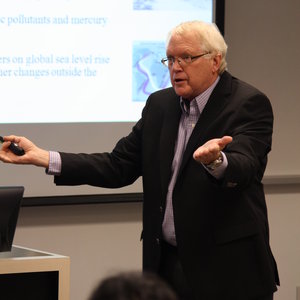Information
Venue
Start
End
20 January 2015 | CIL Seminar Series
Law of the Sea and Ocean Governance in the Arctic: Conflict, Cooperation and Challenges
Introduction

The accelerating loss of sea ice in the Arctic, with prospects for increased shipping and access to vast natural resources, has made the Arctic Ocean a “hot topic”. The Northern Sea Route is already seeing increased vessel transits, rising from 41 in 2011 to over 70 in 2013, while the Northwest Passage experienced its first two commercial cargo transits in 2013 and 2014. The Arctic is estimated to contain 13% of the world’s undiscovered oil and some 30% of the undiscovered natural gas.
This seminar explored three dimensions of the law of the sea and ocean governance in the fast-changing Arctic. First, territorial and jurisdictional conflicts were highlighted. These include the continuing disputes between Canada and the United States over the legal status of the Northwest Passage and the location of the ocean boundary in the Beaufort Sea. Second, the numerous cooperation agreements and arrangements applicable to the Arctic will be discussed, including the central role of the Arctic Council to which Singapore is now an observer, and efforts to negotiate a new Polar Shipping Code and address the long-range transport of persistent organic pollutants (POPs) and mercury into the Arctic. Third, the law of the sea and ocean governance challenges were reviewed, which include the need to enhance future governance arrangements for the central Arctic Ocean beyond national jurisdiction, put the ecosystem approach into practice, and address the many limitations of the Arctic Council. Those limitations include its “soft law” status, lack of secure funding and limited accountability.
About the Speaker
Professor David VanderZwaag holds the Canada Research Chair (Tier 1) in Ocean Law and Governance at Dalhousie University, Halifax, Canada. He teaches in the areas of international environmental law and law of the sea and is the past Co-director of Dalhousie’s interdisciplinary Marine Affairs Program (1986-1991) and the past Director of the Marine & Environmental Law Institute.
Dr. VanderZwaag is currently a member of the IUCN’s World Commission on Environmental Law (WCEL) and Co-chair of the WCEL’s Specialist Group on Oceans, Coasts & Coral Reefs. He is an elected member of the International Council of Environmental Law.
Dr. VanderZwaag has authored over 150 papers in the marine and environmental law field. He has written widely on polar law and policy issues including: co-leading the writing of the Governance of the Arctic Shipping chapter of the Arctic Marine Shipping Assessment (Arctic Council 2009) and co-editing The Challenge of Arctic Shipping: Science, Environmental Assessment and Human Values (Montreal & Kingston: McGill-Queen’s University Press, 1990) and Transit Management of the Northwest Passage: Problems and Prospects (Cambridge: Cambridge University Press, 1988, reprinted 2008). His most recent book publications include: Polar Oceans Governance in an Era of Environmental Change (edited with Tim Stephens) (Cheltenham, UK: Edward Elgar 2014); and Recasting Transboundary Fisheries Management Arrangements in Light of Sustainability Principles: Canadian and International Perspectives (edited with D.A. Russell) (Leiden: Martinus Nijhoff 2010).
Professor VanderZwaag’s educational background includes: PhD (1994, University of Wales, Cardiff), LL.M. (1982, Dalhousie Law School), J.D. (1980, University of Arkansas Law School), M.Div. (1974, Princeton Theological Seminary), and B.A. (1971, Calvin College).
Presentation
To download Prof VaderZwaag’s presentation in PDF format, click here.


